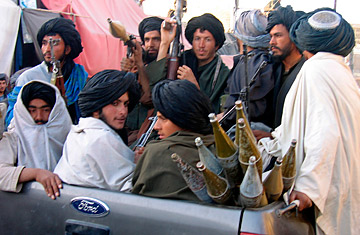
Taliban militants ride in the back of a vehicle as it drives through the Musa Qala district of southern Helmand province in Afghanistan.
I've only started to get into the 92,000 intelligence reports on Afghanistan leaked to the press on Sunday, but so far I agree they make for a depressing reading. And that's not only because we're losing the war in that country. What particularly struck me, as someone who spent a career in the CIA reading good and bad intelligence reporting, is how awful this stuff is. It tells me that we are more blind in Afghanistan than I ever suspected.
One report describes how Osama bin Laden attends a monthly meeting in Quetta, Pakistan, along with Taliban chief Mullah Omar and dozens of other people. It's at these meetings that suicide-bombing attacks in Afghanistan are supposedly planned. At one meeting, according to the report, a payment of $50,000 was authorized for each of the suicide bombers, as well as a promise to take care of their families. This is patent nonsense — it's not just fiction, it's bad fiction. Didn't the author of this report understand that those Taliban who blow themselves up do so for a belief rather than for money? Even more to the point, the author should have known that the reason bin Laden is still alive is that he does not attend committee meetings in Quetta or anywhere else.
Another report has the former head of Pakistan's Directorate of Inter-Services Intelligence Hamid Gul going to Wana, the capital of Pakistan's South Waziristan Agency, to coordinate attacks on NATO forces. The intelligence report has the hallmarks of being provided by a fabricator, a peddler of lies — absence of detail, absence of "actionable" intelligence, and the inclusion of the name of an identifiable public figure. Who knows whether a rogue ISI element is supporting the Taliban, but what should be understood is that it doesn't need or want Gul as an intermediary. The man got out of the business 20 years ago.
As bad as the picture painted by these documents may be, some will argue that there's a lot better intelligence out there — reports WikiLeaks couldn't get their hands on. But the flaw in this argument is that that NATO clearly has been conducting raids based on this or equally faulty intelligence, leading to the unnecessary death of civilians, which, of course adds new recruits to the Taliban.
What should make these documents all the more alarming is that a guerrilla war like the one in Afghanistan heavily relies on dependable, detailed intelligence. Task Force 373 — until now a group composed of American Special Forces — doesn't have the time to decide whether the intelligence it's acting on is good or not. They have no choice but to shoot at whatever moves.
Clearly the CIA and other intelligence agencies are collecting higher quality information than what we've seen in these 92,000 documents — the stuff they're using to conduct Predator attacks on al-Qaeda in the tribal areas of Pakistan. But is it enough to get us out of a quagmire that Afghanistan is today?
Baer, a former Middle East CIA field officer, is TIME.com's intelligence columnist and the author of See No Evil and, most recently, The Devil We Know: Dealing with the New Iranian Superpower.
